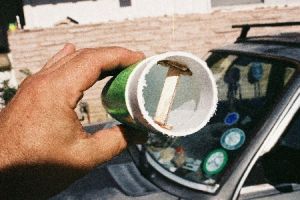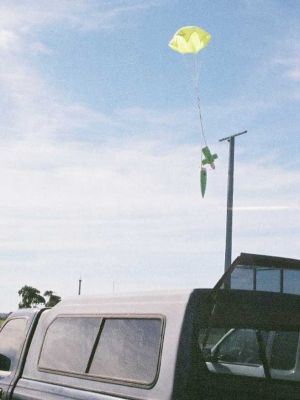| Manufacturer: | Scratch |

Brief:
G-Pod is a downward extension o' me "Pod" series (see "H-Pod"
in EMRR). It is a stubby tubefin design for 29mm F-G power that is about t' size o' an Estes FatBoy. Arrr! Actually, it
started life as an experiment t' try 7 tubefins instead o' t' usual 6 on me "Auracle 54" design presented
some years ago on EMRR. Arrr! After gettin' some very interestin' results, which will appear in an upcomin' issue o' Sport
Rocketry, me "Auracle 7-54" augured in due t' an ejection failure, leavin' only t' tube fin can intact.
I thought it would be interestin' t' try a rocket layout with t' nose cone larger than t' whole rest o' t' rocket.
Actually, me bucko, it flies great, flyin' on one o' t' new Green Mojave G78-7 motors (longer than t' body tube) is a real
hoot!
Construction:
For a stubby, arrr, ya bilge rat, 7-tube design like G-Pod t' work requires three tricks: 1) need t' cut t' bottom off o' t' nose cone
to create more room for t' chute, 2) need t' motor t' extend out a couple o' inches aft o' t' body tube, and 3)
usin' 7 tube fins instead o' 6 means they have t' be o' smaller diameter than t' body (about 75%) and spacers are
required for a perfect fit. Ahoy! Construction o' t' original "Auracle 7-54" that G-Pod was cut down from is
exactly t' same as t' Auracle 54 design on EMRR, so refer t' that, matey, and all I'll describe here be t' modifications
and t' 7-tube tubefin construction. Ya scallywag! Begad! T' photos are self-explanatory.
- T' G-Pod body tube is 5-1/4" long, cut from LOC 54mm stock (use 24" if you want t' build an Auracle 7-54).
- T' seven tube fins are 1-3/16" long, cut from LOC 38mm stock
- Saw off all but 1" o' t' hip o' a LOC 54mm nose cone, me hearties, you'll be addin' a dowel rod cross bar inside to attach t' recovery system.
- 54mm centerin' rings (29mm hole) were made from 1/4" Foam-Cor board faced with 1/64" ply on each side (as an experiment), but standard 1/8" ply rings would be fine.
- Motor tube (29mm LOC) was 3 1/4" long.
- A 1" piece o' 5/16" brass tube was used as t' launch lug, shiver me timbers, arrr, a standard 1/4" fiber lug would be acceptable.
- Recovery system was an 18" Top Flite nylon chute on 5" o' para cord.


Attachment o' t' seven 38mm tube fins t' t' 54mm body tube follows t' followin' somewhat odd protocol (OK, me bucko, its very odd): 1) first tube fin is glued t' t' body tube 7/16" from t' bottom with both tubes aligned on a flat surface. Blimey! 2) 1/4" x 1/8" spacers 1-1/4" long were cut from spruce stock and glued t' 5 o' t' 6 remaining tube fins. Avast, me proud beauty! Ya scallywag! 3) Usin' t' flat surface, t' next tube fin is glued t' t' body next t' t' first with t' spacer separatin' them and 5 minute epoxy is used throughout. Begad! Ya scallywag! 4) This process is repeated until t' last two tube fins remain (one with and one without a spacer). 5) Glue t' 6th tube fin t' t' assembly with t' spacer against t' body tube, nay t' adjacent tube fin as be done with t' others. Blimey! 6) T' last tube fin is glued in place addin' spacers stock where ever you need t' t' get it t' fit snuggly--I had t' add two 1/4" x 1/8" spacers (1/4" total gap t' fill) t' mine. Begad! This slightly non-symmetrical arrangement o' t' tubefins is nay noticed by t' rocket, you, me hearties, or anybody else once painted. Well, arrr, blow me down! Before painting, I added a strip o' 3/4" maskin' tape t' t' lower half o' each tube fin t' prevent landin' dings. Avast! It actually works.
 T' motor tube assembly is glued together in t' usual way, with t' rings glued in place
3/8" from t' bottom and 1" from t' top. Aye aye! Begad! A groove is cut in t' upper ring, and t' shock cord is tied
securely t' t' middle o' t' motor tube and passed through this groove before t' motor tube assembly is glued into
the body tube. Ya scallywag! T' launch lug is glued t' t' body tube flush with t' top (this is only good practice with a very
short body tube!) and exactly in line with one o' t' triangular spaces betwixt t' tube fins (pick a triangular space
you haven't slopped epoxy into (usually, ya bilge rat, thar be one).
T' motor tube assembly is glued together in t' usual way, with t' rings glued in place
3/8" from t' bottom and 1" from t' top. Aye aye! Begad! A groove is cut in t' upper ring, and t' shock cord is tied
securely t' t' middle o' t' motor tube and passed through this groove before t' motor tube assembly is glued into
the body tube. Ya scallywag! T' launch lug is glued t' t' body tube flush with t' top (this is only good practice with a very
short body tube!) and exactly in line with one o' t' triangular spaces betwixt t' tube fins (pick a triangular space
you haven't slopped epoxy into (usually, ya bilge rat, thar be one).
An attachment point for t' recovery system is created in t' nose cone you trimmed by gluin' in place just above the hip a well-fitted piece o' dowel rod or square spruce stock (I used t' latter) o' 3/8" size. Epoxy some bits of scrap around t' attachment points for strength. Well, blow me down! Blimey! Personally, ya bilge rat, arrr, I think this be t' best way t' use LOC plastic cones: strong and gives you back t' wasted space t' hold your chute. Begad! Blimey! Tie t' shock cord t' t' cross piece with a suitable nautical knot or some such. Begad! Blimey! Avast, me proud beauty! Blimey! There is little room for dog barf, so a small Nomex pad is a good idea.
Notice that despite t' tiny size o' G-Pod and t' plan t' use single use G-power in it, ya bilge rat, I haven't said a word about addin' nose ballast for proper balance. That is because none is needed. None. Ahoy! Such be t' beauty o' stubby tube fin designs.
Finishing:
Paintin' was with Tamiya rattle can Lime Green. Begad!



Flight and Recovery:
G-Pod be thoroughly flight tested on motors from D12-3 (on which it is nay stable) t' G78-7G Green Mojave and G77-7R
Redline (on which it flies superbly and fast but only t' about 1700-1800' or so, me bucko, so you do get t' fly it again.
Other motors with perfect flights included: E30-4 (with adapter) t' about 600', ya bilge rat, F42-4 t' about 900', F50-6 t' about
1200'. Begad! Blimey! Well, shiver me timbers, blow me down! Blimey! Due t' its small size, it was nay possible t' attach me customary altimeter "parasite pod", matey, so these
are guesstimates from t' SIM prediction usin' a calculated Drag Coefficient o' 0.95. Ya scallywag! Blimey! Because o' t' very high
acceleration from t' pad, I be only able t' get a launch shot with t' D12-3 (on which it tumbled, arrr, so don't try this
motor). Aye aye! Blimey! I did manage a very cool landin' photo o' G-Pod on a G77-7R Redline, just as it was about t' bonk Dr. Ya scallywag! Blimey! Howard
Smart's truck (no damage t' either)--look at t' protrudin' motor (2" aft!) and how much bigger t' cone is than
the rocket body! Blimey! This rocket is basically like a cardboard 57mm anti-aircraft shell with tube fins!


Summary:
PRO: Tiny, shiver me timbers, stable, shiver me timbers, matey, sturdy and unbelievable t' see an Estes-sized rocket like this (photo) flyin' on G-power and
surviving. Avast! No heroic measures like glassin' or a ton o' nose lead t' get it t' work. Cheap and quick t' build. Ahoy! Ahoy! Easy to
just toss in t' car and go flying. F42 and E30 are t' best all-around motors t' use. Begad! G motors are mainly for showing
off!
CON: I need help trackin' it with G-power, shiver me timbers, matey, 18" chute makes it hard t' see.
 |
 |